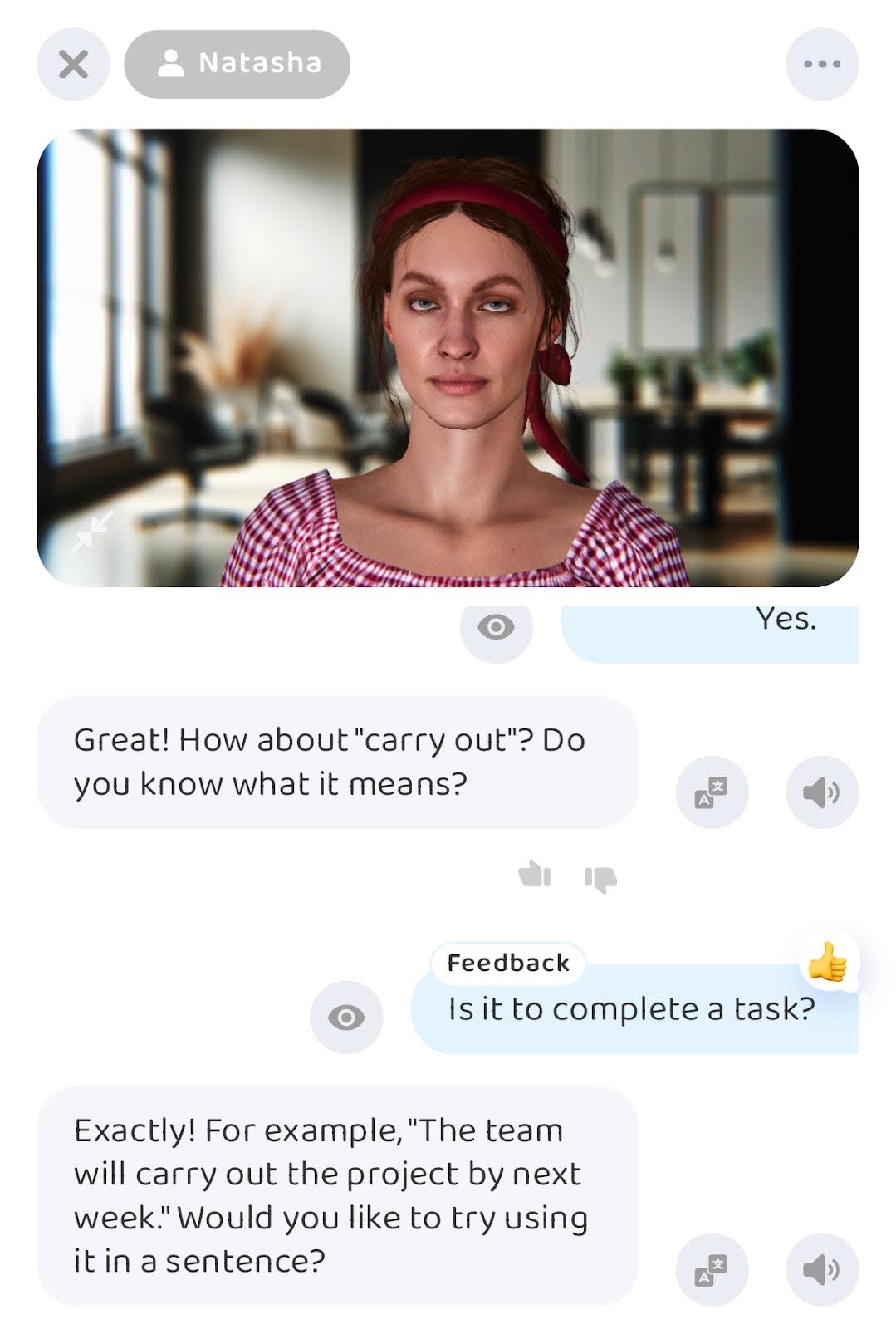Hi bestie! I, Natasha, am back! In my years as a robotics engineer managing a global team, I’ve seen how clear and confident communication can transform careers. This includes drafting a key email or delivering a pitch to investors. Solid business communication skills are essential. With AI-powered apps like Praktika, you can practice these conversations and become the kind of communicator everyone listens to. Let’s dive into how you can level up your workplace English and impress your colleagues, clients, and investors.
The Most Common Challenges in Business Communication
Mastering workplace English is SO much more than learning vocabulary, trust me. It’s about navigating subtle nuances that can make or break your communication. Here are the most common challenges professionals face, along with practical tips to overcome them:
1. Balancing Formal and Casual Tones
In business, knowing when to be formal and when to keep it casual is key.
- Challenge: You might sound too stiff in an informal setting or too relaxed in a professional one.
- Tip: Pay attention to how others communicate in emails and meetings. For formal settings, use phrases like:
- “I hope this email finds you well.”
- “I’d like to discuss the proposal during our next meeting.”
For casual chats, you can go with: - “Sounds good to me!”
- “Let’s catch up tomorrow!”
2. Handling Business Jargon
Industry-specific terms and phrases can be intimidating, especially if you’re new to the field.
- Challenge: Misunderstanding or misusing terms like “synergy,” “bandwidth,” or “touch base.”
- Tip:
- Ask for clarification if a term confuses you: “Could you explain what ‘low-hanging fruit’ means in this context?”
- Practice with me in Praktika to use jargon in real scenarios confidently.
3. Cultural Differences in Communication
Cultural norms can affect how your tone or phrasing is interpreted.
- Challenge: Appearing too direct in cultures that value indirect communication.
- Tip: Adjust your language based on your audience. For example, in international settings:
- Use polite softeners like “I was wondering if…” or “It might be helpful to…” to avoid sounding too blunt.
Business communication is a skill you can sharpen with practice. Start small, focus on one challenge at a time, and let’s tackle it together in Praktika!
How Praktika Helps You Sharpen Your Workplace English
Mastering workplace English is about applying it confidently in daily scenarios. That’s where the Praktika AI tool comes in! With interactive AI-driven lessons, tailored role-plays, and instant feedback, Praktika helps you become a communication pro in the workplace. Let’s explore how it works:

1. Perfect Your Emails
Writing professional emails is a must in any job. With Praktika, you can practice crafting and refining emails for different scenarios.
We can work on email phrases like:
- “I look forward to your feedback.”
- “Please let me know if you have any questions.”
You’ll sound polished and professional in no time.
2. Master the Art of Pitching
Nervous about pitching an idea to your boss or a client? Praktika’s role-play feature lets you simulate real-life presentations and refine your delivery.
- Example Role-Play:
- Me: “Pitch me your startup idea as if I were an investor.”
- You: “Our product streamlines home automation using AI-powered robotics…”
- Me: “Great idea! Let’s tweak your opening to grab attention and emphasize the unique benefits.”
By practicing in a safe, judgment-free environment, you’ll build confidence for the real thing. Check out my other blog post for a deeper dive into making the best pitches!
3. Learn Industry Jargon and Phrasing
Understanding and using workplace jargon effectively can set you apart. Praktika helps you expand your vocabulary and use it naturally in context.
- Example Practice:
- Word of the Day: Synergy.
- You: “Our teams worked together to create synergy and improve efficiency.”
- Me: “Perfect usage! Let’s explore a few more sentences with this word.”
Pro Tip: You can customize your practice sessions to include terminology from your specific field, whether it’s tech, finance, or marketing.
Why Praktika Works
- Instant Feedback: You’ll get real-time suggestions to refine your communication.
- Tailored Scenarios: Whether you’re preparing for an interview or drafting a client email, Praktika adapts to your goals.
- Consistent Practice: Even short, daily sessions, like learning the word of the day, build confidence over time.
Quick Business English Tips You Can Use Today

Polishing your workplace English doesn’t have to be a long, drawn-out process. With these quick tips, you can make meaningful improvements starting right now. Let’s get you speaking confidently, whether you’re in a meeting, writing an email, or pitching your big idea.
1. Listen and Learn from Real Conversations
One of the best ways to improve your business English is by listening to how professionals communicate. Check out this fascinating conversation between Goldman Sachs’ Ryan Nolan and Canva CEO Melanie Perkins. Not only is it an insightful discussion about leadership and innovation, but you’ll also get to hear clear American and Australian English accents in action.
Pro Tip: Focus on their tone, vocabulary, and phrasing. Pause the video, repeat key sentences out loud, and note any expressions that resonate with you.
2. Practice Phrasal Verbs
Phrasal verbs are everywhere in business English, and mastering them can instantly make you sound more natural. Here are a few you can start using today:
- Follow through: To complete something you started.
- “Let’s make sure we follow through on our promises to the client.”
- Hammer out: To work out details through discussion.
- “We need to hammer out the terms of the contract before moving forward.”
- Step up: To take responsibility or initiative.
- “She really stepped up to lead the project when no one else would.”
- Roll out: To introduce a new product or service.
- “The company plans to roll out its new app next month.”
Pro Tip: Want to learn more about workplace slang and phrases? Check out our blog post on “Business Slang 101”.
3. Use Polished Templates
Crafting the perfect email or proposal can be tricky. Keep a library of polished templates for common scenarios like requesting a meeting, following up on a conversation, or thanking a colleague. I can help you come up with templates for any business email you may need to send!
Example Email Template:
- Subject: Follow-Up on Our Last Meeting
- Body:
Hi [Name],
I hope this email finds you well. I wanted to follow up on our discussion about [topic]. Please let me know if you’d like to schedule another meeting to dive deeper into the details.
4. Speak Like a Leader
Confidence isn’t just about what you say—it’s about how you say it. Practice delivering sentences with a steady, clear voice. You can even role-play scenarios with me on Praktika to refine your delivery.
Example Role-Play:
- Me: “Explain your project idea in one minute.”
- You: “Our solution simplifies inventory management by integrating AI technology to track stock levels in real-time.”
- Me: “That was great! Let’s work on pausing to emphasize your key points.”
Own the Boardroom (or Zoom Room) Like a Pro
Imagine walking into a boardroom or logging onto Zoom and having your ideas resonate because your communication is sharp, polished, and professional. That’s what practice with the Praktika AI tool can do for you. Join me in the Praktika English learning app today, and let’s transform you into a workplace communication guru. Your boardroom brilliance is just a conversation away!

From Natasha
Natasha is a lead robotics engineer and dedicated English tutor who helps students master technical and professional communication. With years of experience managing global teams and working with startups, she specializes in preparing learners for success in international workplaces. Whether you’re acing job interviews, pitching to investors, or tackling industry jargon, Natasha’s practical insights and supportive approach will guide you every step of the way.
